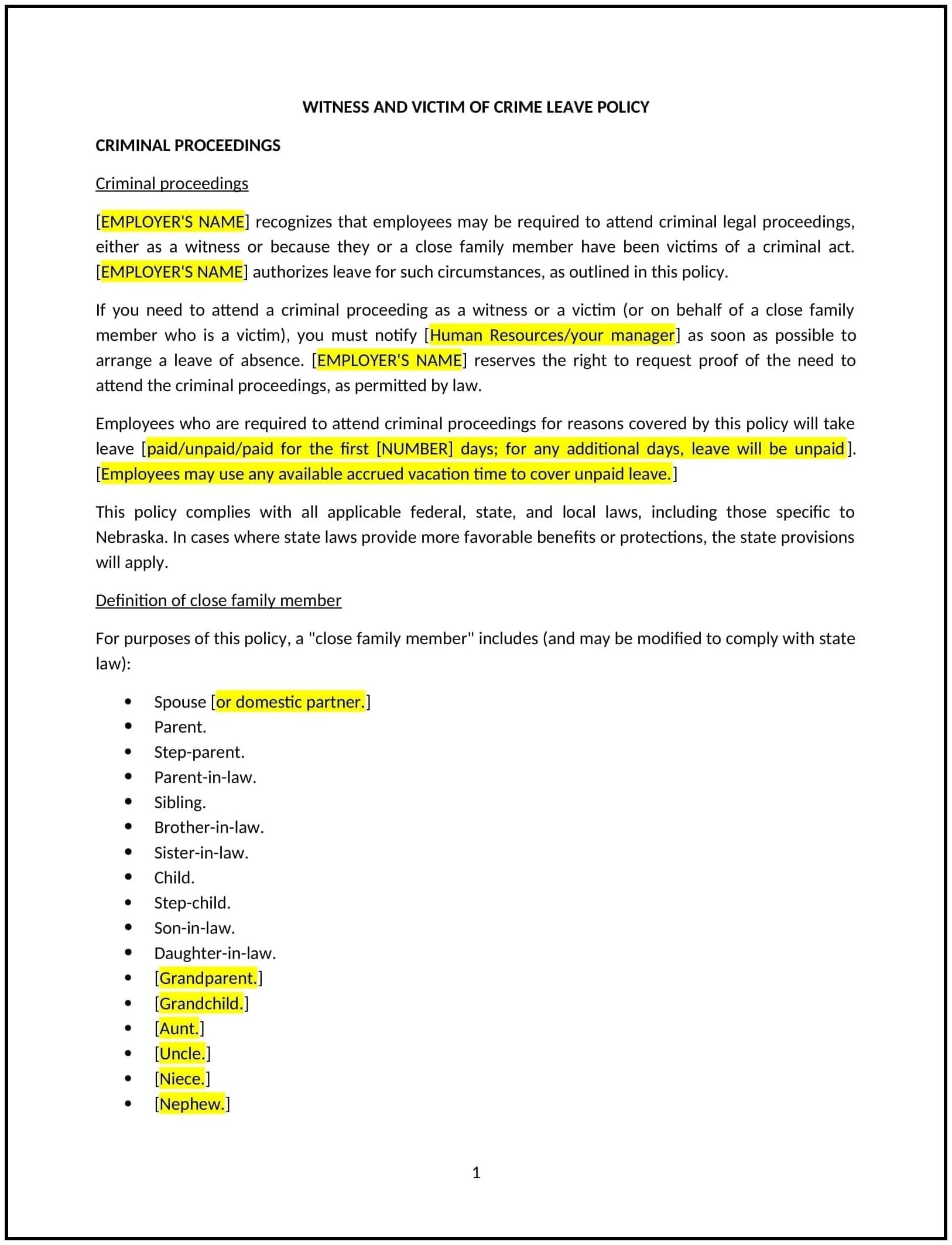Witness and victim of crime leave policy (Nebraska): Free template
Got contracts to review? While you're here for policies, let Cobrief make contract review effortless—start your free review now.

Customize this template for free
Witness and victim of crime leave policy (Nebraska)
A witness and victim of crime leave policy helps Nebraska businesses support employees who are affected by being a witness or victim of a crime. This policy outlines the rights and procedures for employees to take time off to attend court proceedings, testify as witnesses, or recover from the emotional or physical impact of being a crime victim. It is designed to support employees while balancing their legal obligations with their work responsibilities.
By adopting this policy, businesses in Nebraska can demonstrate empathy and provide support to employees who are impacted by crime, while maintaining fair and consistent practices in the workplace.
How to use this witness and victim of crime leave policy (Nebraska)
- Define eligibility: Clearly specify which employees are eligible for crime leave, such as full-time or part-time employees. Outline the types of crimes that qualify for leave, including violent crimes, domestic abuse, or other offenses that require employee participation as a witness or victim.
- Outline the process for requesting leave: Provide a clear procedure for employees to request crime leave, including the notice period required, how to submit a request (e.g., written or via an HR system), and any documentation required, such as court subpoenas or police reports.
- Specify the length of leave: Define how much time off an employee is entitled to in the event they are a witness or victim of a crime. The policy should address whether leave is paid or unpaid, or if employees can use their regular paid time off (PTO) for the leave.
- Explain job protection: Clarify whether employees will be guaranteed job protection during the time they take for crime leave. The policy should specify if employees are entitled to return to their previous position after taking time off.
- Provide guidelines for supporting victims of crime: Include provisions for employees who are victims of crime, offering time off for recovery, counseling, or other services needed to cope with the emotional and psychological impact. Clearly state the company’s commitment to supporting employees during their recovery.
- Ensure confidentiality: Stress the importance of confidentiality when dealing with personal information regarding the crime. Ensure that any details about the employee’s situation or leave request are handled sensitively and in accordance with privacy laws.
- Review and update: Regularly review and update the policy to ensure it aligns with Nebraska state laws, reflects the company’s evolving needs, and stays relevant as new legal standards or crime-related situations arise.
Benefits of using this witness and victim of crime leave policy (Nebraska)
This policy provides several benefits for Nebraska businesses:
- Supports employees during challenging times: By offering leave for victims and witnesses of crime, businesses show their commitment to the well-being of employees, helping them manage the emotional and physical challenges that may arise after a crime.
- Reduces absenteeism: Offering designated time off for crime-related issues reduces the likelihood of employees using unscheduled leave or calling in sick to attend legal matters or recover from a traumatic event.
- Improves employee morale and trust: Demonstrating empathy and support through this policy builds trust with employees, fostering a positive work environment and increasing job satisfaction.
- Minimizes legal risk: A clear and transparent crime leave policy helps businesses comply with state regulations, preventing potential legal issues and ensuring that employees are treated fairly.
- Enhances company reputation: A business that provides support to victims and witnesses of crime is viewed positively in the community, which can improve the company’s reputation and attract top talent.
Tips for using this witness and victim of crime leave policy (Nebraska)
- Communicate the policy clearly: Ensure that all employees are informed about the witness and victim of crime leave policy, how to request leave, and the documentation needed. Include the policy in employee handbooks and review it during onboarding sessions.
- Provide training to managers: Train managers and HR staff on how to handle leave requests related to crime, including how to address sensitive situations and ensure employees feel supported.
- Encourage timely communication: Employees should be encouraged to notify the company as soon as possible when they need to take leave for crime-related matters. The policy should clarify the timeframes for submitting requests.
- Monitor the effectiveness of the policy: Regularly assess how well the policy is working, gather feedback from employees who have used the leave, and make any necessary adjustments to ensure that the policy meets the needs of both the business and employees.
- Review relevant laws: Keep updated on Nebraska state laws regarding crime leave to ensure that the company’s policy complies with any changes to legal requirements.